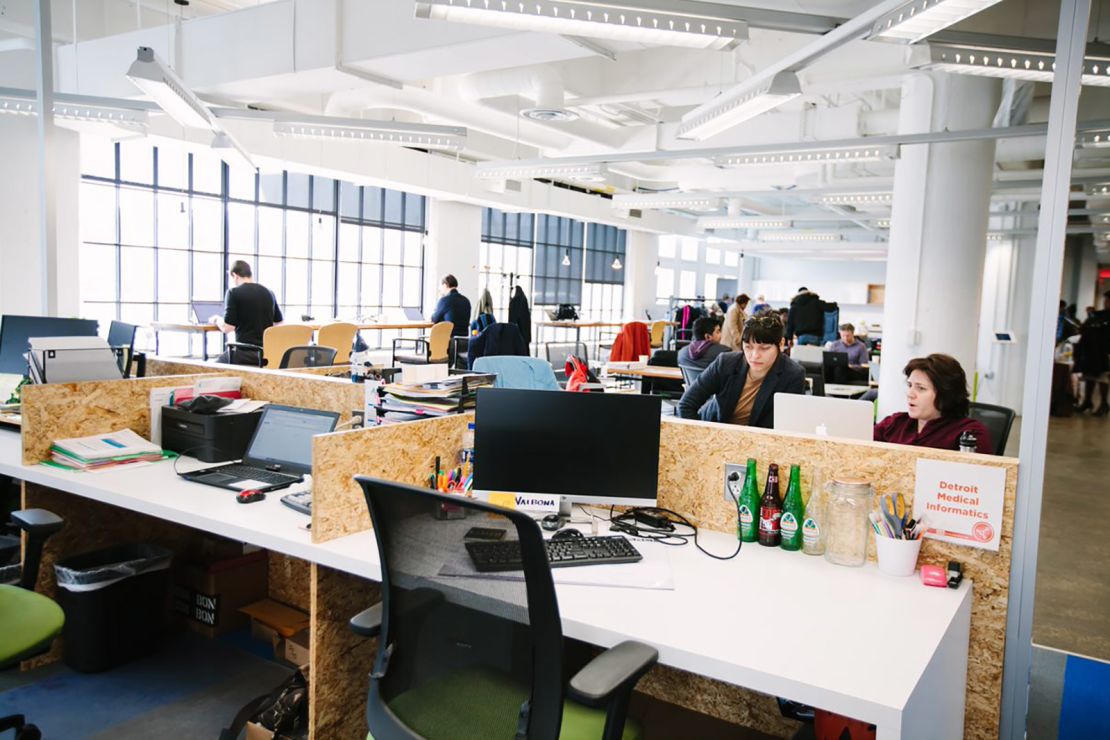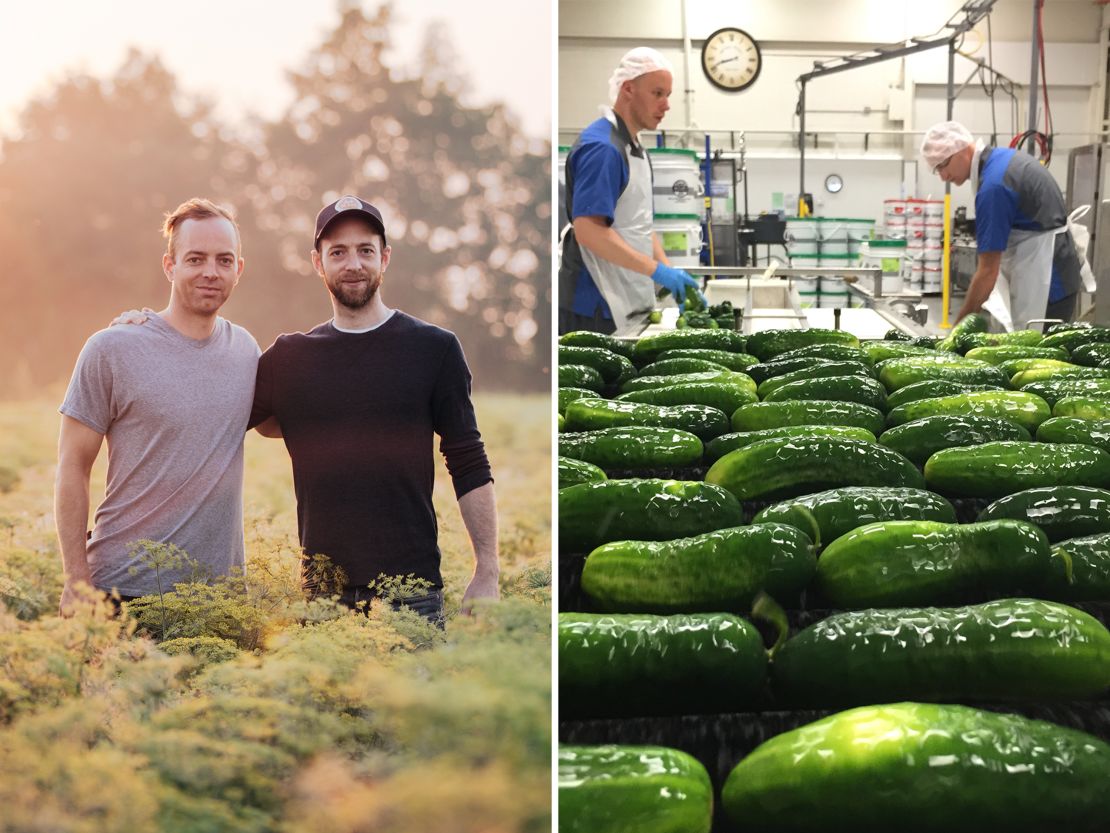Editor’s Note: This story originally published on July 16, 2018.
Entrepreneurship is in Detroit’s DNA. It’s what turned it into one of America’s most iconic cities, known the world over as the heart of both the nation’s automobile industry and the birthplace of music’s “MoTown sound” genre.
Now a new generation of entrepreneurs is committed to doing it all over again.
Just five years after Detroit was forced to file for bankruptcy protection, the city has become a thriving hub of innovation and entrepreneurship.
An uptick in investment money from the city, private funders and large business like Quicken Loans has revved up startup activity. Office spaces are no longer sitting empty. Families are buying homes in Detroit neighborhoods, which in turn has brought back demand for goods and services.
“There’s crazy energy that makes you want to be here if you’re an entrepreneur,” says Melissa Butler, founder of The Lip Bar, a vegan and cruelty-free line of cosmetics based in Detroit.

Butler originally launched The Lip Bar in New York in 2012, running it part-time while she worked as a financial analyst with Barclays. But she was soon looking to Detroit.
At the time, Motor City was on the financial brink and struggling with steep unemployment of over 20%. A year later it would become the nation’s largest public sector bankruptcy.
But Butler saw opportunity there.
Business capital, both private and public, was being made available to entrepreneurs who has compelling startup ideas that would generate revenue, create new jobs and put Detroit on the path toward economic recovery.
“When I saw the narrative of Detroit changing after bankruptcy from a city in despair to opportunity, I moved my brand there to be part of that renaissance,” says Butler.
In 2013, she quit her job on Wall Street and a year later relocated to her hometown of Detroit in order to focus full-time on her startup.
Butler quickly secured a $20,000 small business loan from non-profit lender Detroit Development Fund.
Real estate was very cheap and she rented her initial office space in the city for just $300. She’s since moved the business into a bigger location two miles east of downtown Detroit, which she rents for $1,700, and hired nine staff members. “It would easily been double that in NYC,” she said.
The Lip Bar also has one retail store in Detroit.
“Everyone thought I was crazy, but moving back has been the best thing for me and my business,” she said.
Earlier this year, she scored a deal with Target to supply her products to 142 stores nationwide. She’s now looking to hire four more people as her business ramps up.
In many ways, Detroit’s bankruptcy has become a reset.
People are buying homes again. Demand for goods and services is robust and the city’s Mayor Mike Duggan, elected in 2013, has worked hard to cement confidence in the future, says Michael Rafferty, vice president for small business with Detroit Economic Growth Corporation.
“There’s no way Detroit could recover if the city administration first didn’t assume fiscal responsibility,” he says. “But this entrepreneurial activity has changed the image of Detroit, which has contributed to its comeback.”
The city has helped with that too.
Under Duggan, it partnered with Detroit Economic Growth Corporation and other city agencies to launch the Motor City Match grant program to provide a total of $500,000 in funding every quarter to new or expanding startups in Detroit.
Since inception, the program has provided 100 grants totaling more than $5 million through which 36 businesses to date have opened and another 33 are in the pipeline.
‘Diverse entrepreneurial culture’
Small businesses were already finding a home in Detroit before its bankruptcy. But there’s been a surge of activity since.
In the last few years, startups from consumer products to innovative tech, food and transportation companies have been launched.
Located in a former General Motors auto dealership and service center in which a prototype of the Chevrolet Corvette was designed, TechTown has helped more than 2,000 startups grow, many of them tech focused, by connecting them with funding and other resources.
The incubator has been supporting entrepreneurs in Detroit since 2000. More recently, the volume of entrepreneurs remains robust with TechTown supporting as many as 450 businesses every year.
The huge growth has been helped by a combination of factors, including an available skilled workforce and low overhead costs, explains Paul Riser, TechTown’s managing director.

Not only is the cost of real estate still low in Detroit compared to other cities, banks are now more readily providing loans for businesses to acquire commercial space, says Rafferty, of Detroit Economic Growth Corporation.
Private funding has also been integral, says Pamela Lewis, director of the New Economy Initiative in Detroit.
Launched in 2007, the philanthropy has given more than $115 million in grants to dozens of nonprofits, business accelerators, and entrepreneurial training programs that have helped launch and grow nearly 1,600 ventures in the Detroit metro area. Those organizations and programs also provided technical support to 5,000 neighborhood-based businesses, enabling these ventures to create more than 6,600 jobs.
“For decades there’s been a healthy and painful reliance on just one sector [in Detroit],” says Lewis. “We thought it would be useful to take our grant dollars and reinvigorate a diverse entrepreneurial culture so that anyone with a great idea could create a business. This way we are better prepared for the new economy by embracing newer industries.”
Prior to Detriot’s bankruptcy, the bulk of the New Economy Initiative’s early investments were made in tech-led ventures. Afterward, it began to increase investments in the city’s non-tech and neighborhood businesses, which now represents more than half of its grantmaking budget.
“These businesses grow fast and they generate jobs. We realized it was important to be inclusive of them,” said Lewis.
‘Screw bankruptcy’
Brothers Bob and Joe McClure started their pickle company McClure’s Pickles in Troy, Michigan, in 2006 using their great-grandmother Lala’s recipe. “As kids we’d make pickles every summer and hand them out to family and friends,” says Joe.
The brothers moved the firm to Detroit in 2012, around the time the city was experiencing a culinary renaissance. “We were distributing our products to half the country by then,” said Joe.
A year later, however, Detroit filed for bankruptcy. But it didn’t spook the McClure brothers.
“Screw bankruptcy,” said Joe. “Many local entrepreneurs, ourselves included, banded together with a pledge to help Detroit recover and grow.”
Five years later, McClure’s Pickles are being sold in stores like Walmart, Costco and Kroger. The company has 34 employees, continues to turn a profit and is growing revenue between 12% and 20% annually.
In July, the brothers bought the 20,000 square-foot former American Axel & Manufacturing building they had been leasing for their headquarters and manufacturing facility.

Besides grants, the city’s small business ecosystem is being propped up by other private funding programs, including lenders like Quicken Loans.
Founded by Detroit native Dan Gilbert, Quicken moved its headquarters to downtown Detroit in 2010. In 2017, the company announced a $1 million startup pitch contest called Detroit Demo Day for Detroit-based entrepreneurs with a product or service that was ready to hit the market. Last year there were eight winners.
This year’s seven winners received a total of $1.2 million in funding through grants, interest-free loans or equity investments that ranged from $50,000 to $300,000 each.
Michigan Farm to Freezer, a startup that flash freezes (each piece is frozen separately) fruits and vegetables like carrot, broccoli and blueberries that are grown in the state and supplies them to schools, hospitals and retail stores won $325,000 this year.
“Detroit offers us access to the market there and the regional markets,” says Brandon Seng, who founded the firm in Traverse City in 2012 and relocated it to Detroit in 2017.
“We can do 10 times the volume here than what we are currently doing. We want to go from statewide reach to regional growth next,” said Seng, who recently hired eight new employees.

For established businesses that rode out Detroit’s bankruptcy, like commercial plumbing and water conservation contractor Benkari LLC, the city’s recovery is paying rich dividends.
“We’ve weathered the storm here since we started in 2008. It was probably the worst time to start a business just as the economy was going into recession,” says A.K. Bennett, who manages the second-generation firm with his mother Adrienne.
For a few tough years, the business was forced to find any consulting work it could to keep going, but things have since taken a turn.
“There are so many new restaurants, stores, commercial buildings up and running. We have new construction, renovations, rebuilding work,” said Bennett. “Many people who left are moving back to Detroit.”
Benkari’s revenue tripled in 2016 from the previous year and has increased steadily since.
“We think it will triple again this year because of some big contracts for us,” he said. Those include the Little Caesars Arena and the Anthony Wayne Housing Development.
It’s a good problem to have.
“We’re probably going to be very busy for the next four years,” said Bennett. “This is an exciting time. We’re very happy for Detroit.”



